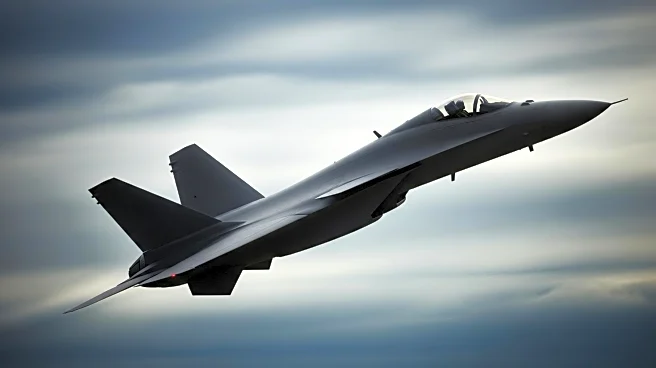What is the story about?
What's Happening?
The United Kingdom has announced the acquisition of 12 new F-35A fighter jets to participate in NATO's dual-capable aircraft nuclear mission. This procurement marks a significant step in reintroducing the UK's airborne nuclear deterrent capability, allowing the Royal Air Force to operate aircraft capable of carrying both conventional and nuclear payloads. The announcement was made by Air Chief Marshal Harv Smyth during the 2025 DSEI UK show in London. The new jets will be stationed at RAF Marham, contributing to the UK's goal of securing a total of 138 F-35 aircraft over the program's lifetime. This move aligns the UK with other NATO members, including the United States, Germany, Italy, the Netherlands, Belgium, Greece, and Turkey, which currently operate similar platforms.
Why It's Important?
The acquisition of F-35A jets by the UK is a strategic enhancement of NATO's nuclear deterrence capabilities. It underscores the UK's commitment to maintaining a robust defense posture amid global security challenges. By joining other NATO members in operating dual-capable platforms, the UK strengthens its role in collective defense and deterrence strategies. This development is particularly significant given the geopolitical tensions involving countries like Russia, China, Iran, and North Korea, which Air Chief Marshal Smyth highlighted as active in today's battle space. The move also reflects the UK's ambition to position itself as a world defense superpower, leveraging air and space power as key components of national security.
What's Next?
The integration of the F-35A jets into the RAF's operations will likely involve extensive training and strategic planning to maximize their capabilities within NATO's framework. The UK government may continue to pursue additional defense initiatives to bolster its military capabilities further. As the geopolitical landscape evolves, NATO and its member states, including the UK, will need to adapt their strategies to address emerging threats and maintain a credible deterrence posture. The acquisition may also prompt reactions from adversaries, potentially influencing their military strategies and diplomatic engagements.
Beyond the Headlines
The UK's decision to enhance its nuclear deterrence capabilities raises important ethical and strategic considerations. The reintroduction of nuclear-capable aircraft may spark debates on nuclear proliferation and the balance between deterrence and disarmament. Additionally, the focus on air and space power highlights the evolving nature of warfare, where technological advancements play a crucial role in national defense strategies. The long-term implications of this development may include shifts in defense policies and international relations, as countries navigate the complexities of modern security challenges.















